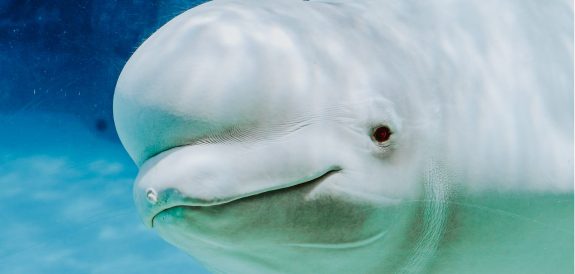Please note that there have been new developments in our ongoing efforts to protect whales from suffering in captivity. Visit this page for more up-to-date information.
This week, The Whale Sanctuary Project announced it has chosen a site in Nova Scotia to serve as a sanctuary for whales raised in captivity. This could be big news for more than 50 belugas living in overcrowded conditions at Marineland in Niagara Falls, Ontario.
The announcement follows Canada’s recent move to ban the keeping and breeding of whales and dolphins in captivity. The ban does not apply to the 60+ whales and dolphins already held at Marineland, or to Helen the white-sided dolphin, who is confined at the Vancouver Aquarium.
Animal Justice is working hard to ensure the brightest future possible for Canada’s captive whales and dolphins. Marineland is regularly accused of animal cruelty and neglect, so it may come as a surprise that Animal Justice and a coalition of animal protection groups in Canada and around the world are working to block a proposal to transfer five belugas from Marineland to Mystic Aquarium in Connecticut. Here are six reasons why we oppose the transfer:
1. The research can be done at Marineland
As set out in its application for a US import permit, Mystic Aquarium wants to use five belugas from Marineland for research that could benefit wild populations of belugas, which face serious threats from climate change, ocean noise, pollution, and the aquarium industry. However, the vast majority of the research proposed can be done at Marineland. This would also mean a larger sample size, and the five belugas would be spared the tremendous stress associated with transport by truck and plane, and the resulting disruption of their social groupings.
We would like to see Mystic Aquarium work with Marineland to conduct the research at Marineland by making the effort needed to enrich the lives of the belugas housed there and improve their living conditions. In the long run, the belugas at Marineland would ideally be transferred to a seaside sanctuary. The recently-announced site in Nova Scotia will likely have space for only eight whales, but it is an important first step toward a more humane future for whales and dolphins currently kept in small tanks as an archaic form of human entertainment.
2. The belugas will be allowed to breed
With the passage of Bill S-203, it is now against the law to keep whales and dolphins in captivity for entertainment, and to allow them to breed in captivity. This is for good reason—a life in captivity can cause serious physical and psychological harm to these intelligent, social animals whose natural ranges can span thousands of kilometres of open ocean. Belugas born in captivity cannot be released into the wild, so banning captive breeding in Canada means putting a stop to the outdated practice of keeping whales and dolphins in concrete tanks.
In its import permit application, Mystic Aquarium is clear that it will not prevent the five belugas from breeding, and that their offspring will spend their lives in captivity. This means future generations of baby belugas entering the captive display system in the United States—an activity that would be a criminal offence in Canada.
3. The belugas will be put on public display
To clamp down on the international trade in whales and dolphins, these animals can’t be imported or exported without a permit from the Minister of Fisheries and Oceans. The permit can only be issued if it is for scientific research or in the animal’s best interests.
Although Mystic Aquarium proposes to use the five belugas for scientific research, it also intends to place the belugas on public display 24/7. When the research is concluded, the whales and their offspring would continue to be held at Mystic Aquarium, Georgia Aquarium, or other aquariums in the United States. Presumably, they would be held not for research at that point but entirely for public display.
Blurring the important distinction between scientific research and captivity for human entertainment is bad, not only for these five belugas. It would set a dangerous precedent for exporting whales and dolphins from Canada to public display facilities, so long as the facility claims it will also use the animals for scientific research. This could mean a massive loophole in Canada’s new laws.
4. Moving the belugas is unlikely to improve their living conditions
The 50+ belugas at Marineland are widely recognized to be living in overcrowded conditions. However, they have been in these conditions for years, and removing five belugas will not significantly increase space available to the remaining whales kept in three tanks.
The tank at Mystic Aquarium is shallower than at least one of Marineland’s three beluga enclosures. There are already three belugas at Mystic Aquarium, and eight will arguably make that facility a “full house”—and that’s before any calves are born.
The tank at Georgia Aquarium (which would “own” three of the whales to be exported) is entirely indoors, meaning that any belugas ultimately transferred there would be denied the sunlight and fresh air to which they are accustomed. There are already five belugas at Georgia Aquarium (by the facility’s own reckoning this is its maximum capacity), with one birth expected in the coming months. Transferring any of these belugas or their offspring to Georgia Aquarium would place them in overcrowded conditions entirely indoors.
5. Georgia Aquarium’s troubling history
Mystic Aquarium is partnering with Georgia Aquarium in its attempt to import the five belugas. In 2012, Georgia Aquarium applied for a permit to import 18 wild-caught belugas from Russia, arguing that capturing these whales and importing them for captive display would help conservation of belugas in the wild. This was after it tried to acquire belugas from Marineland, only to learn that the facility’s then-owner was uninterested.
When the Aquarium tried to have the National Marine Fisheries Service decision to deny the import permit overturned, the Court found that Georgia Aquarium’s “conservation” claim was bogus—the beluga population was depleted and importing them was contrary to the Marine Mammal Protection Act. Unfortunately, by this time Georgia Aquarium had already commissioned the capture of the 18 belugas. Four of the 18 belugas, who were imprisoned in a holding facility in the Black Sea for years since Georgia Aquarium did not yet have a permit, died during the regulatory process and litigation.
It is likely that at least three of the five belugas from Marineland would be transferred to Georgia Aquarium, or other facilities in the US, at some point. We are concerned that the proposed export of these five belugas could be a thinly veiled effort for public display facilities in the US to acquire more belugas for public display and breeding.
6. The transfer could increase demand for wild-caught belugas
Any live trade in belugas, whether of wild-caught or captive-born animals, can increase the demand for, and encourage the capture of, these species from the wild. For example, belugas in the Russian Far East have been live-captured for decades for the global marine theme park trade. Allowing the transfer of five belugas from Marineland to American facilities could increase demand, as well capture operators’ perceptions that there is a market for wild-caught whales or their descendants, and perpetuate wild-captures to meet anticipated demand to supply live belugas to the global public display industry.
Please act now and the Fisheries Minister to deny beluga export permits to Marineland.
Take Action to Block Marineland's Export Permits!
Join the Animal Justice mailing list




